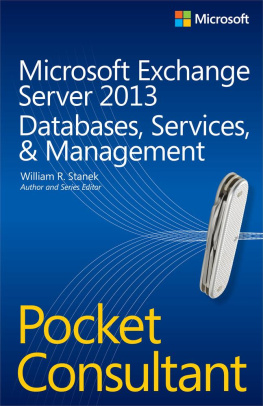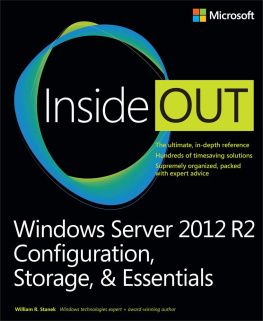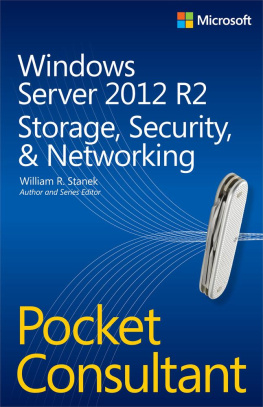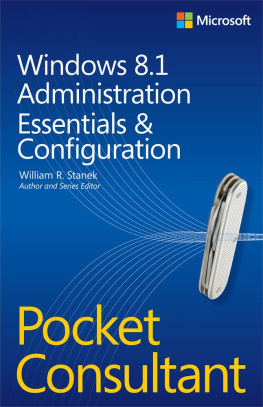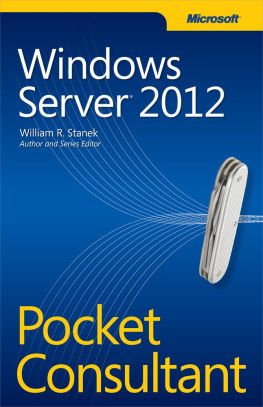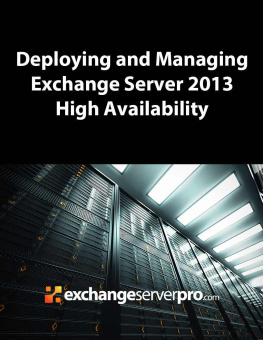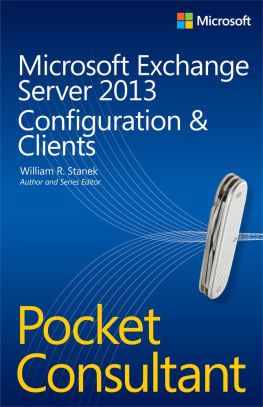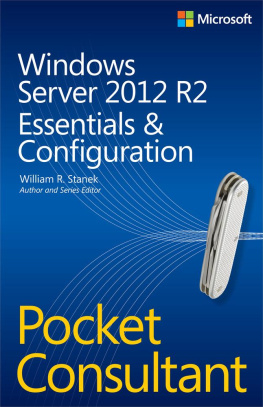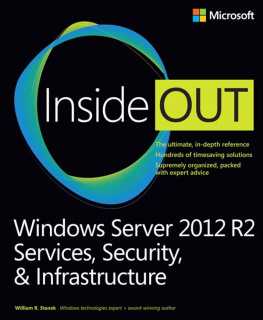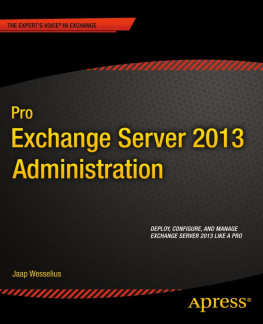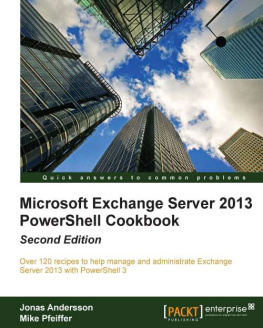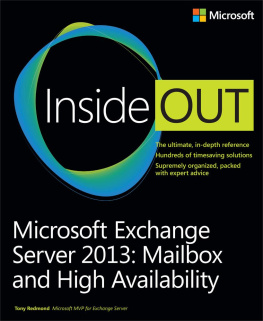Microsoft Exchange Server 2013 Databases, Services, & Management: Pocket Consultant
William R. Stanek
Published by Microsoft Press
Special Upgrade Offer
If you purchased this ebook directly from oreilly.com, you have the following benefits:
DRM-free ebooksuse your ebooks across devices without restrictions or limitations
Multiple formatsuse on your laptop, tablet, or phone
Lifetime access, with free updates
Dropbox syncingyour files, anywhere
If you purchased this ebook from another retailer, you can upgrade your ebook to take advantage of all these benefits for just $4.99. to access your ebook upgrade.
Please note that upgrade offers are not available from sample content.
Acknowledgments
To my readers Microsoft Exchange Server 2013 Pocket Consultant: Databases, Services, & Management is my 42nd book for Microsoft Press. Thank you for being there with me through many books and many years.
To my wifefor many years, through many books, many millions of words, and many thousands of pages shes been there, providing support and encouragement and making every place weve lived a home.
To my kidsfor helping me see the world in new ways, for having exceptional patience and boundless love, and for making every day an adventure.
To Anne, Karen, Martin, Lucinda, Juliana, and many others whove helped out in ways both large and small.
Special thanks to my son Will for not only installing and managing my extensive dev lab for all my books since Windows 8 Pocket Consultant but for also performing check reads of all those books as well.
William R. Stanek
Introduction
M icrosoft Exchange Server 2013 Pocket Consultant: Databases, Services, & Management is designed to be a concise and compulsively usable resource for Exchange Server 2013 administrators. This is a resource guide that youll want on your desk at all times. The book covers everything you need to perform the core administrative tasks for Exchange databases, transport services, mail flow, and Client Access servers, whether your servers are running on Windows Server 2012 or Windows Server 2008 R2. Because the focus of this book is on giving you maximum value in a pocket-size guide, you dont have to wade through hundreds of pages of extraneous information to find what youre looking for. Instead, youll easily find exactly what you need to get the job done.
This book zeroes in on daily administrative procedures, frequently performed tasks, documented examples, and options that are representative although not necessarily inclusive. One of my goals is to keep the content so concise that the book remains compact and easy to navigate while at the same time ensuring that the book is packed with as much information as possible. Thus, instead of a hefty 1,000-page tome or a lightweight 100-page quick reference, you get a valuable resource guide that can help you quickly and easily perform common tasks, and solve problems.
Although you might not install Exchange Server 2013 on touch-enabled computers, you can still manage Exchange Server 2013 from your touch-enabled computers; therefore, understanding the touch UI in addition to the revised interfaces options will be crucial to your success. For this reason, I discuss both the touch UI and the traditional mouse and keyboard techniques throughout this book.
When you are working with touchenabled computers, you can manipulate on-screen elements in ways that werent possible previously. You can enter text by using the on-screen keyboard and also in the following ways:
Tap . Tap an item by touching it with your finger. A tap or double-tap of elements on the screen generally is the equivalent of a mouse click or double-click.
Press and hold . Press your finger down and leave it there for a few seconds. Pressing and holding elements on the screen generally is the equivalent of a right-click.
Swipe to select . Slide an item a short distance in the opposite direction compared to how the page scrolls. This selects the items and also might bring up related commands. If pressing and holding doesnt display commands and options for an item, try using swipe to select instead.
Swipe from edge (slide in from edge) . Starting from the edge of the screen, swipe or slide in. Sliding in from the right edge opens the Charms panel. Sliding in from the left edge shows open apps and allows you to easily switch between them. Sliding in from the top or bottom edge shows commands for the active element.
Pinch . Touch an item with two or more fingers and then move the fingers toward each other. Pinching zooms in or shows less information.
Stretch . Touch an item with two or more fingers and then move the fingers away from each other. Stretching zooms out or shows more information.
As youve probably noticed, a great deal of information about Exchange Server 2013 is available on the web and in other printed books. You can find tutorials, reference sites, discussion groups, and more to make using Exchange Server 2013 easier. However, the advantage of reading this book is that much of the information you need to learn about Exchange Server 2013 is organized in one place and presented in a straightforward and orderly fashion. This book has everything you need to master Exchange databases, transport services, mail flow, and Client Access servers.
In this book, I teach you how features work, why they work in the way that they do, and how to customize features to meet your needs. I also offer specific examples of how certain features can meet your needs, and how you can use other features to troubleshoot and resolve issues you might have. In addition, this book provides tips, best practices, and examples of how to optimize Exchange Server 2013. This book wont just teach you how to work with Exchange databases, transport services, mail flow, and Client Access servers; it will teach you how to squeeze every last bit of power out of these features and options while making the most of what Exchange Server 2013 provides.
Unlike many other books about administering Exchange Server 2013, this book doesnt focus on a specific user level. This isnt a lightweight beginner book. Regardless of whether you are a beginning administrator or a seasoned professional, many of the concepts in this book will be valuable to you, and you can apply them to your Exchange Server 2013 installations.
Who is this book for?
Microsoft Exchange Server 2013 Pocket Consultant: Databases, Services, & Management covers the Standard and Enterprise editions of Exchange Server 2013. The book is designed for the following readers:
Current Exchange Server 2013 administrators
Current Windows administrators who want to learn Exchange Server 2013
Administrators upgrading to Exchange Server 2013 from Exchange Server 2007 or Exchange Server 2010
Administrators transitioning to Exchange Server 2013 from Exchange Server 2003
Administrators transferring from other messaging servers
Managers and supervisors who have been delegated authority to manage mailboxes or other aspects of Exchange Server 2013
To pack in as much information as possible, I had to assume that you have basic networking skills and a basic understanding of email and messaging servers. With this in mind, I dont devote entire chapters to explaining why email systems are needed or how they work, nor do I devote entire chapters to installing Exchange Server 2013. I do, however, provide complete details on the components of Exchange organizations and how you can use these components to build a fully redundant and highly available messaging environment. You will also find complete details on all the essential Exchange administration tasks for availability groups, Exchange databases, mail flow, transport services, Client Access servers, and much more.

